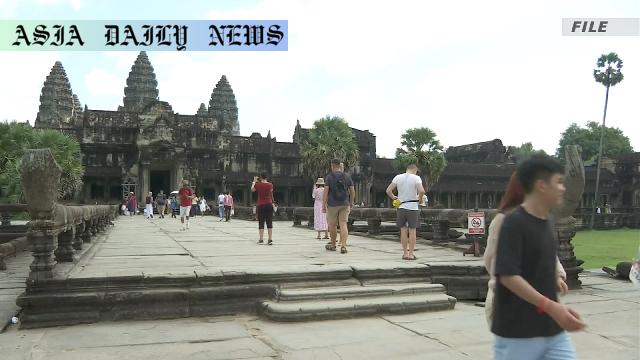Angkor Wat tragedy raises concerns as Cambodian authorities go silent to protect the tourism sector.

Lightning Strikes Angkor Wat: A Tragic Incident
On Friday, the famous Angkor Wat temple complex in Cambodia experienced a devastating natural disaster when a sudden lightning strike claimed three lives. Angkor Wat, a UNESCO World Heritage Site and an iconic symbol that even graces the Cambodian flag, remains one of the most significant cultural landmarks in the world. The tragedy, however, has been met with surprising silence from Cambodian authorities, sparking concerns and debate among the public and the media.
The decision to remain tight-lipped stems from fears over potentially damaging Cambodia’s vital tourism industry. Angkor Wat is a major contributor to Cambodia’s economy, having attracted nearly one million international visitors last year alone. As a result, officials have reportedly abstained from issuing any official announcements and even urged locals and tourists alike to refrain from sharing details or posting about the incident online. The reasoning appears to be a calculated attempt to mitigate the potential negative impact on the country’s image as a top travel destination.
The Balancing Act: Preserving Tourism While Addressing Tragedy
Cambodia’s approach to this crisis reveals the delicate balance governments often face between safeguarding their post-disaster image and addressing the genuine concerns of local and international communities. While public acknowledgment could increase global awareness and potentially marshal resources for prevention and safety improvements, officials appear more concerned about the immediate repercussions that such news might have on tourism. With Angkor Wat as a cornerstone of the nation’s heritage and economy, there is immense pressure to preserve its reputation.
Despite the silence from official sources, the incident has highlighted the importance of public awareness campaigns surrounding natural disaster risks. Cambodia, like many other Southeast Asian nations, faces seasonal bouts of extreme weather conditions that increase the likelihood of lightning and other dangers. Creating preparedness initiatives and providing clear guidelines for both locals and tourists could help mitigate future risks and ensure that tragedies like this one are avoided.
Angkor Wat’s Importance to Cambodia’s Identity
Angkor Wat is more than a tourist attraction; it is deeply ingrained in Cambodia’s national identity. The magnificent structure epitomizes the grandeur of the Khmer Empire and serves as a powerful reminder of the country’s rich cultural and historical heritage. Its annual influx of visitors brings not only monetary benefits but also global recognition, embodying Cambodia’s resilience and cultural pride.
However, such tragedies underscore the vulnerabilities inherent in heavily relying on tourism as a major economic driver. The government’s decision to focus on image control rather than transparent reporting raises questions about accountability and the prioritization of human lives over economic considerations. Striking a balance between protecting national interests and addressing the immediate fallout of a humanitarian crisis remains a challenging task, but one that must be navigated with thoughtfulness and care.
Looking Ahead: Lessons Learned from Tragedy
This incident serves as a sobering reminder of the unpredictable nature of life and the importance of implementing proactive safety measures, particularly in a nation that depends so heavily on its landmarks. While it is understandable that Cambodia seeks to preserve its tourism-driven economy, addressing the tragedy openly and learning from it could lead to systemic improvements. Increased investment in weather warning systems, on-site safety infrastructure, and public awareness campaigns could prevent similar incidents in the future.
Ultimately, a transparent, solution-focused approach can bridge the gap between preserving Cambodia’s tourism appeal and ensuring the well-being of visitors and locals alike. Tragic events such as this should inspire vigilance, care, and resilience in the face of adversity, ensuring a safer and more sustainable future for Cambodia’s most prized cultural treasure.
Commentary
The Need for Transparency Amid Tragedy
The Cambodian government’s decision to withhold information about the lightning strike at Angkor Wat raises important ethical considerations surrounding crisis communications. While their concerns regarding the potential impact on the tourism industry are valid, the lack of transparency may undermine public trust and intensify speculation. Governments have an inherent obligation to provide the public with accurate and timely information, especially when lives are lost. Addressing the tragedy head-on with compassion and clarity could have been an opportunity to reaffirm Cambodia’s commitment to safety while honoring the victims.
Tourism Versus Accountability
Tourism remains a vital pillar of the Cambodian economy, contributing significantly to livelihoods and international visibility. The pressures faced by government officials to safeguard such a crucial sector are immense. However, it is critical to weigh these financial priorities against the importance of human life and transparency. By openly acknowledging the incident and working to improve safety measures, the government could reassure tourists that their well-being is a central priority. It is a delicate balancing act but one that ultimately benefits both sides in the long run.
Opportunities for Improvement
Tragedies such as this should not only prompt mourning but also inspire critical changes. Whether it is investing in enhanced safety protocols, fostering awareness about seasonal weather risks, or offering counseling and support to those affected, there is much to learn and implement from this incident. Cambodia is presented with a chance to take proactive steps, transforming a tragedy into a blueprint for improvement and resilience. Angkor Wat’s legacy is one of endurance and strength — values that the Cambodian government and its citizens must embody during this challenging time.


